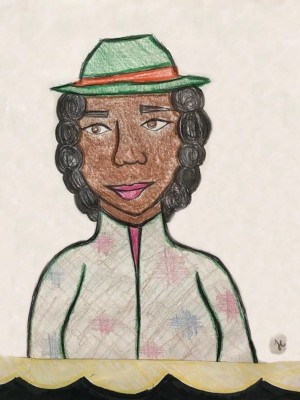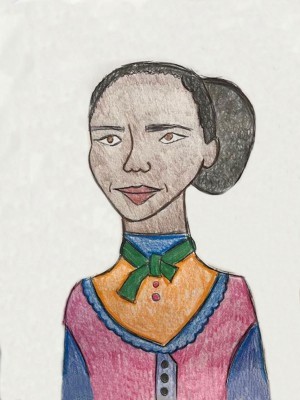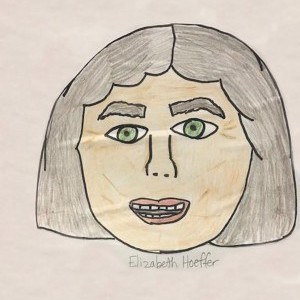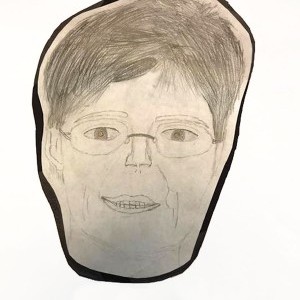Jordan Cook
Bel Air High School | Bel Air, MD | 9-10th Grade
Inspirational Family Member
Mary Lizzy Morton
The person in my family I chose to write about is my great-great-grandmother, Mary Lizzy Morton. Mary was a very business-minded woman and economic leader. Born on January 15, 1916 to Sarah Walton and James Henry Walton, she was raised in the deep south of Virginia. Her father built houses, farmed, and grew tobacco.
Mary went to school for black children because of segregation. The law did not allow black children in school beyond 8th grade. As a result, Mary was determined to find work. After meeting Charles Henry Morton, her future husband, she moved to Baltimore to work as a maid for a private white family in Roland Park. Charles Henry soon followed and they got married. They lived on 955 Chapel Street in Baltimore before buying a house on 1322 Chester Street. Shortly afterwards, she gave birth to two girls, Fanny and Ella.
After the 19th Amendment, Mary became a registered member of the Democratic Party. My grandfather would drive her to the election polls to vote. She was excited about President Kennedy because of the hope he brought to the Civil Rights Movement. She proudly displayed pictures of President Kennedy and Martin Luther, King, Jr. in her living room. Participating in elections was very important to her because she knew that her voice mattered both as a woman and as a black person in America. She understood that all politics were local and did her part in the voting booth to ensure that Baltimore and America overall would have the type of political leaders that would improve her life and her children's lives as black women.
In 1962, Mary's husband died of a heart attack. She continued working as a maid and for Bugle Laundry. Afterwards, Mary started to sell her home-made sweet potato pies and chicken and fish dinners to supplement her income to pay her mortgage on the house which was $75 a month until it was paid off. She was an integral part of First Apostolic Faith Church and the president of the Pastor's Aides and an active member until her death in 2004.
Historical Figure I Admire
Frances Ellen Watkin Harper
In the year 1825, a free spirited, striking, canny, alluring woman was born. Frances Ellen Watkin Harper was an insightful African American leader, abolitionist, poet, teacher, writer, activist and suffragette. Throughout her lifetime she fought oppression and injustice by using her words, and by her doing this, Frances inspired people.
Frances Harper was born in Baltimore Maryland in September, 24, 1825 while slavery was still in process. Frances did not have any siblings, and she was the only person set free out of her African American family. Unfortunately, at the age of three Frances's mother died, so Frances was raised by her uncle and aunt who were also free African Americans. Then when the time came for Frances to get her education, she attended The Academy of Negro Youth which was a school enforced by her uncle, Reverend William Watkin. Around this time in Harper's youth she started to find interest and attachment in writing poetry- and started writing her experiences in journals. At the age of thirteen, Frances had got her first job training to be a domestic worker, and she did this while still attending school. After Harper finished school, she found an occupation as a maid in a Quaker household. Even though at this point Harper was finished school, Harper still frequently read the books that were in the library of the Quaker household while also finding time to write her poetry, and continuing her job. Harper had worked at the Quaker household for about fifteen years, then began teaching by 1845. Harper had also written her first poem, “Forest Leaves.” in 1845.
In 1850, Harper decided to move to Ohio and attempt to be a full time domestic worker in Union Seminary. There, she taught sewing and household skills, but also served as a maid. While Frances was in Ohio, she obtained more opportunities to read her poetry to people, and there, Harper grew as a poet.
One very important person who influenced Harper's life and career pathway was John Brown. Brown was an American abolitionist, and Frances followed Brown in being an abolitionist, but Frances wanted to use her writing and poetry to fight against slavery and would soon use it to influence women's suffrage. In 1854, Harper had met Fredrick Douglass at the Abolitionist Movement and read one of her poems from her novel, “Poems of Miscellaneous Subjects.” The poem she read at the movement was titled, “Bury Me in a Free Land.”
While working as a committed abolitionist and writer, in 1859 Frances Harper made literary history by being the first African American women to publish a short story. Then momentarily in the year 1860 Frances married a man she loved named Fenton Harper. After Frances's marriage, she made the choice to get away from the media and live with her husband and start a family in Ohio. In 1862 Frances gave birth to Mary Frances Harper.
Tragically in 1864, Harpers husband died. So, Frances decided to go back to the lecture circuit and to keep sharing her poetry and opinions with the public. She then published several long-formed poems that became extremely popular. One of these poems that was published was titled, “The Martyr of Alabama,” (1894.) But Harper's most famous and remembered novel was titled, “Iola Leroy,” which was one of her last poems published. Soon after, in 1896, Harper cofounded the National Association of Colored Women. Harper achieved to build this organization with Ida Wells-Barnett and Harriet Tubman. This organization gave and helped African American women by advancing their voting rights, and giving them a voice.
Finally, in Frances's elderly years, she had used more time resting, but still worked at the organizations she helped built. By this time Frances had been a faithful member of the Women's Christian Temperance Union. Harper sadly passed away from heart failure in February, 22, 1911 in Philadelphia Pennsylvania. Harper was buried in the same cemetery next to her daughter, in Eden Cemetery.
Frances Harper lived a long beautiful life of eighty-six years, and she, as a single woman, never stopped fighting for equality for everyone, and she believed everyone should be treated fair and wouldn't stop until people were treated equally. One of Frances Harper's most famous quote is, “The respect that is only bought by gold is not worth much.” Frances truly valued equality and respect. This also gave people strength and hope. Frances Harper touched the lives of many people, and will always be remembered.
What the Project Means to Me
Voting on federal, state, and in local voting elections is extremely important because voting affects our community. Most people only have access to vote in local elections, and citizens do not think their vote matters on the local level. This is wrong because local elections determine our state senators, judges, legislatures, mayors, governors, etc. These people can determine what happens to our states, and laws that are enforced in our state.
Next, in state elections, people vote for representatives and they make decisions in the state they live in, which affects the people who live in that state. Lastly, it is extremely important to vote in a federal election because the senators that we vote for make decisions for our state, and bring our ideas that we have as a state to Washington, D.C..
I learned many things working on this project, and I have a higher understanding and respect for women now. It was really interesting to learn more about my family and the issues and oppression my great-great grandmother, Mary Lizzy Morton, had to face. It was even more interesting learning the love that she spread to many people and how she fought through oppression and the issues she faced. Along with this, learning about Frances Harper was fascinating, and it inspires me how she made a name for herself by using her words and poetry. In conclusion, I have taken away many things from this project, and I think this experience has benefited me as a young adolescent, and I want to continue to learn more about people in my family and about women in history.
Explore the Archive
More From This Class
Click on the thumbnails below to view each student's work.Deadline Extended
There's still time to join Women Leading the Way.
Become a part of our storytelling archive. Enroll your class today.
Join the Project







